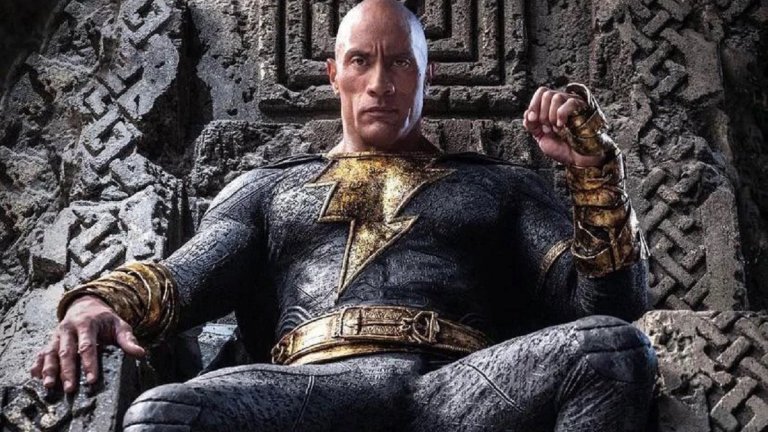Can Black Adam Box Office Save the DCEU?
For months we’ve heard that Black Adam will change the hierarchy of power in the DCEU, but can it also save Warner Brothers’ troubled shared universe?

Black Adam just enjoyed the biggest solo opening of Dwayne Johnson’s career. That has got to feel good for an actor who’s pursued the DC antihero since at least 2006—back when he was first approached about playing the character in a Shazam! movie. Almost 20 years later, Johnson was able to finally don the black onesie in a solo movie where Black Adam was neither hero nor villain… in fact, he was quite a bit like Johnson’s old school WWF wrestling persona: The Rock, the People’s Champion.
So the fact that Black Adam grossed $67 million over this past weekend is a personal vindication for a performer who is also a producer on the project. And the opening tops Johnson’s previous biggest debut where he was the lead actor in the film, 2019’s Fast & Furious Presents: Hobbs and Shaw, which premiered at about $60 million flat. Just below that, Jumanji: The Next Level opened at $59.3 million, also in 2019. So for the Rock, $67 million is both a record and also consistent with his best pre-pandemic numbers. Yet it’s still less than when Rock was part of an ensemble (though perhaps the key component) in Furious 7, which opened to $147.2 million, and The Fate of the Furious, which bowed at $99 million its first three days (the best debuts of that franchise).
It is also considerably below what studio accountants have come to expect from superhero blockbusters. Marvel antihero Venom opened at $80 million in 2018 despite similarly divisive reviews to Black Adam; DC’s own Wonder Woman opened to $103 million in 2017; and Man of Steel was considered a disappointment when it premiered to $116.6 million nearly a decade ago in 2013.
Of course Man of Steel was heralded as the triumphant return of the most recognized superhero in the world, whereas Black Adam is essentially an introduction to a character that the vast majority of the film’s target audience has never heard of. So expectations are different. Nonetheless, there’s a lot of pressure placed on Black Adam which for nearly a year has been marketed as a DC game-changer; it is the movie that Johnson promised, repeatedly, would change the hierarchy of power in the DC universe forever. Implicitly, this meant also realigning and tweaking what most folks call the DC Extended Universe (DCEU).
While Zack Snyder’s brief and tumultuous tenure as the mastermind behind the DCEU has its admirers—so much so they convinced Warner Bros. to release Zack Snyder’s Justice League on HBO Max last year after Snyder was effectively pushed off the project by the studio in 2017—the weak critical reception of the first several DCEU movies, including Man of Steel, Batman v Superman: Dawn of Justice (2016), and Suicide Squad (2016), led to a skittishness about WB’s newly minted shared cinematic universe. Given the steep box office drop of BvS, it would seem audiences were also apprehensive, all of which culminated in the bizarre Justice League theatrical cut that was released into theaters in 2017, and which may go down in history as one of the most fascinating box office flops of the 21st century. (That movie also opened at about $94 million.)
Even before Justice League’s commercial and critical failure, the DCEU had pivoted with success via Wonder Woman, and would see box office laurels achieved once more a year later with Aquaman (2018). Despite this, WB has been visibly gun-shy about overtly shared DC universe movies ever since 2017, letting directors and filmmakers do their own thing relatively divorced from each other. Personally, we’d argue this was a creative boon for movies like last year’s The Suicide Squad, a soft-reboot courtesy of James Gunn, and it certainly paved the way for movies like Joker (2019) and this year’s The Batman, both of which won over critics and audiences to astounding numbers.
However, as fans are keen to have noticed by now, both of those box office victories have sequels in production. Meanwhile there is no official movie in active pre-production that’s set in the DCEU. Next year will see the release of Shazam! Fury of the Gods, Aquaman and The Last Kingdom, and allegedly The Flash. However, there has been no script written yet for Wonder Woman 3, Harley Quinn has just been recast in Joker: Folie à Deux (which creates a perception problem that new Warner Bros. Discovery leadership reportedly wants to avoid going forward), and there are still no publicly announced plans about what to do with the DC universe’s biggest hitters: Superman and Batman.
Black Adam coyly attempts to answer some of that confusion by, as the Rock says, clarifying the hierarchy of power in the DC universe. But is it enough for a studio who’s current head is so ambivalent about talent’s opinions and ideas that he shelved a near-completed Batgirl movie for a $90 million tax break?
If we’re being honest, it is hard to say. To date, new Warner Bros. Discovery CEO David Zaslav has stated his primary interest for WB’s theatrical ventures is movies based on intellectual property that can make money comparable to Marvel Studios, which just turned Doctor Strange into nearly a billion-dollar franchise. Supposedly, the studio’s leadership even has a new “10-year plan” in place to turn DC into a true competitor with Marvel at the box office.
And yet… they’ve failed to greenlight official DCEU movies, and the newest one starring Dwayne Johnson made about half what Man of Steel did nine years ago.
The hierarchy of the DCEU might be changed, but the universe still doesn’t look as invulnerable as Black Adam himself.
